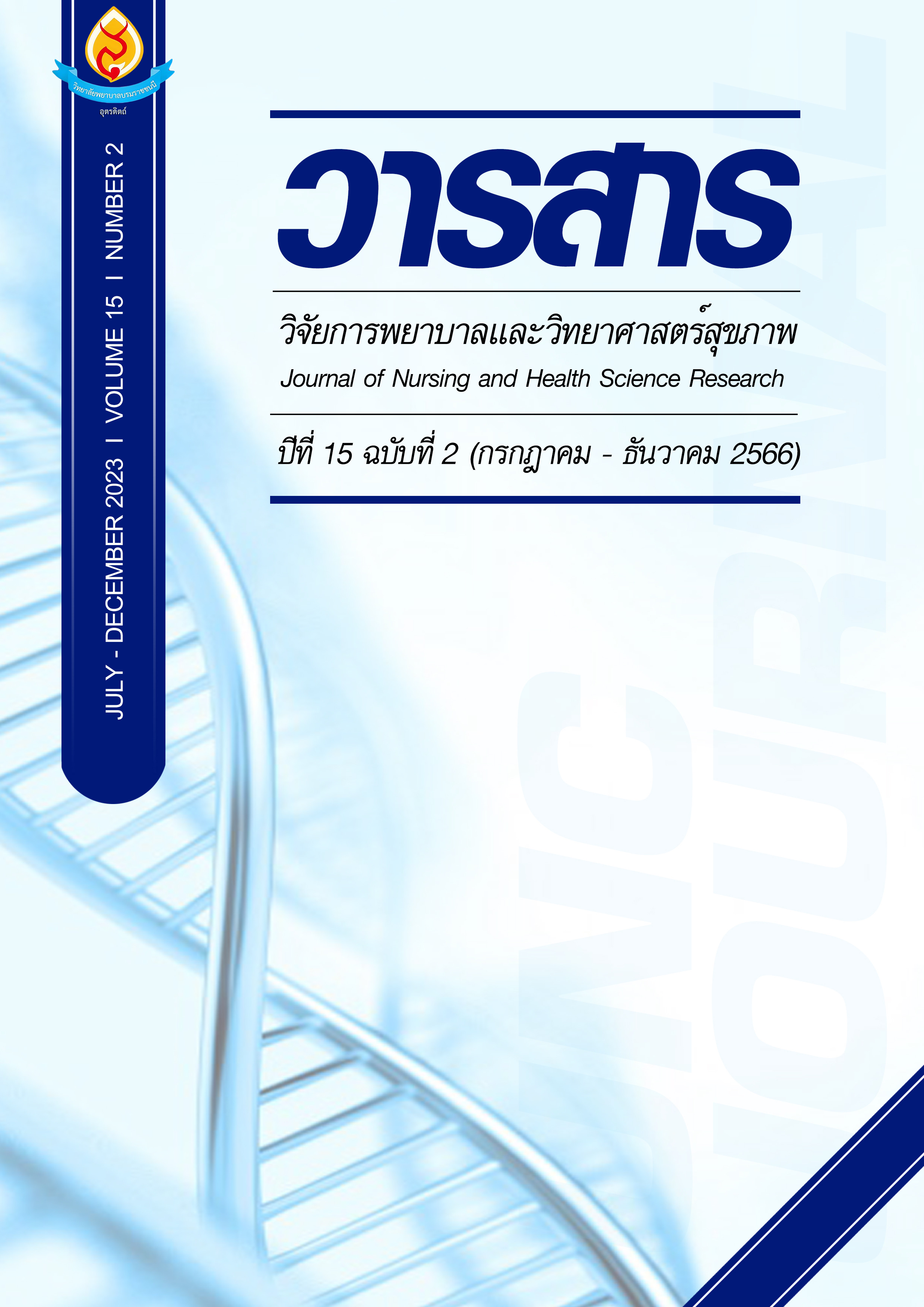ความรอบรู้ด้านสุขภาพและพฤติกรรมสุขภาพ ของผู้ป่วยโรคความดันโลหิตสูงที่ควบคุมระดับความดันโลหิตได้ และผู้ป่วยโรคความดันโลหิตสูงที่ควบคุมระดับความดันโลหิตไม่ได้
Main Article Content
บทคัดย่อ
การวิจัยเชิงบรรยายแบบเปรียบเทียบ (descriptive comparative research) ครั้งนี้ มีวัตถุประสงค์เพื่อศึกษาและเปรียบเทียบระดับความรอบรู้ด้านสุขภาพและระดับพฤติกรรมสุขภาพของผู้ป่วยโรคความดันโลหิตสูงที่ควบคุมระดับความดันโลหิตได้และผู้ป่วยโรคความดันโลหิตสูงที่ควบคุมระดับความดันโลหิตไม่ได้ กลุ่มตัวอย่าง คือ ผู้ป่วยโรคความดันโลหิตสูง จำนวน 92 คน ที่ได้จากการสุ่มแบบง่าย โดยแบ่งเป็นกลุ่มที่ควบคุมระดับความดันโลหิตได้และกลุ่มที่ควบคุมระดับความดันโลหิตไม่ได้ กลุ่มละ 46 คน ที่มารับบริการที่โรงพยาบาลส่งเสริมสุขภาพตำบลแห่งหนึ่งในจังหวัดพะเยา เครื่องมือที่ใช้ คือ แบบสอบถามความรอบรู้ด้านสุขภาพและแบบสอบถามพฤติกรรมสุขภาพของผู้ป่วยโรคความดันโลหิตสูง มีค่าสัมประสิทธิ์อัลฟาของ ครอนบาค เท่ากับ .92 และ .87 ตามลำดับ วิเคราะห์ข้อมูลด้วยสถิติพรรณนา และ Independent t-test
ผลการวิจัยพบว่ากลุ่มตัวอย่างที่ควบคุมระดับความดันโลหิตได้มีความรอบรู้ด้านสุขภาพและพฤติกรรมสุขภาพอยู่ในระดับสูง (𝑥̅ = 108.07 SD=12.15 และ 𝑥̅ = 43.87 SD=2.75 ตามลำดับ) และกลุ่มตัวอย่างที่ควบคุมระดับความดันโลหิตไม่ได้มีความรอบรู้ด้านสุขภาพอยู่ในระดับต่ำ (𝑥̅ = 90.11 SD=12.36) และพฤติกรรมสุขภาพอยู่ในระดับปานกลาง (𝑥̅ = 33.32 SD=4.96) เมื่อเปรียบเทียบความแตกต่างของความรอบรู้ด้านสุขภาพและพฤติกรรมสุขภาพของทั้ง 2 กลุ่ม พบว่ามีความรอบรู้ด้านสุขภาพและพฤติกรรมสุขภาพที่แตกต่างกันอย่างมีนัยสำคัญทางสถิติ (t=7.03, p≤.000 และ t=12.61, p≤.000 ตามลำดับ)
ข้อเสนอแนะจากการวิจัย ควรมีการพัฒนาโปรแกรมส่งเสริมความรอบรู้ด้านสุขภาพและพฤติกรรมสุขภาพของผู้ป่วยโรคความดันโลหิตสูงเพื่อคงไว้ซึ่งการควบคุมระดับความดันโลหิตได้อย่างเหมาะสม
Article Details

อนุญาตภายใต้เงื่อนไข Creative Commons Attribution-NonCommercial-NoDerivatives 4.0 International License.
บทความหรือข้อคิดเห็นใดใดที่ปรากฏในวารสารวิจัยการพยาบาลและวิทยาศาสตร์สุขภาพ เป็นวรรณกรรมของผู้เขียน ซึ่งบรรณาธิการหรือสมาคมศิษย์เก่า ไม่จำเป็นต้องเห็นด้วย และบทความที่ได้รับการตีพิมพ์เผยแพร่ถือเป็นลิขสิทธิ์ของวารสารวิจัยการพยาบาลและวิทยาศาสตร์สุขภาพ
เอกสารอ้างอิง
Akbarpour, S., Khalili, D., Zeraati, H., Mansournia, M. A., Ramezankhani, A. & Fotouhi, A. (2018). Healthy lifestyle behaviors and control of hypertension among adult hypertensive patients. Scientific reports, 8(1), 8508. https://doi.org/10.1038/s41598-018-26823-5
Division of Non-Communicable Disease, Department of disease Control, Ministry of Public Health. (2020). Non-communicable disease information. Retrieved from
http://www.thaincd.com/2016/mission/documents.php?tid=32&gid=1-020 (in Thai).
Fuchs, F. D. & Whelton, P. K. (2020). High blood pressure and cardiovascular disease. Hypertension, 75(2), 285-292.
Gaffari-Fam, S., Babazadeh, T., Oliaei, S., Behboodi, L. & Daemi, A. (2020). Adherence to a health literacy and healthy lifestyle with improved blood pressure control in Iran. Patient preference and adherence, 14, 499-506. https://doi.org/10.2147/PPA.S244820
Health Education Division, Department of Health service Support, Ministry of Public Health.
(2017). Health literacy and health behavior assessment from according to 3aor 2sor of the people aged 15 years or more, revised version 2018. Retrieved from http://www.hed.go.th/linkHed/333 (in Thai).
Meelab, S., Bunupuradah, I., Suttiruang, J., Sakulrojanawong, S., Thongkua, N., Chantawiboonchai, C., ... & Sakboonyarat, B. (2019). Prevalence and associated factors of uncontrolled blood pressure among hypertensive patients in the rural communities in the central areas in Thailand: a cross-sectional study. PloS one, 14(2), e0212572.
Modey Amoah, E., Esinam Okai, D., Manu, A., Laar, A., Akamah, J. & Torpey, K. (2020). The role of lifestyle factors in controlling blood pressure among hypertensive patients in two health facilities in urban Ghana: a cross-sectional study. International Journal of Hypertension, 2020. https://doi.org/10.1155/2020/9379128
Mohd Isa, D., Shahar, S., He, F. J. & Majid, H. A. (2021). Associations of health literacy with blood pressure and dietary salt intake among adults: A systematic review. Nutrients, 13(12), 4534. https://doi.org/10.3390/nu13124534
Nutbeam, D. (2008). The evolving concept of health literacy. Social science & medicine, 67(12), 2072-2078.
Padphai, I., Meelun, N., Chotchai, T., Sripromsa, W., Ekathat, T. & Chotklang, D. (2022). The relationship between health literacy for stroke prevention and optimal blood pressure in hypertensive patients in Health Region 7. Nursing Journal of The Ministry of Public Health, 32(3), 149-162. (in Thai).
Puengsema, R. (2022). Hypertension: the important role of nurses. Thai Red Cross Nursing Journal, 15(1), 40-49. (in Thai).
Sarrafzadegan, N., Mansourian, M., Alikhassi, H., Sherafat, A., Khosravi, A., Eghbali, M., … & Barghi, M. (2021). Self-care behaviours and determinants associated with hypertension control in elderly patients. Journal of Patient Care, 7(3), 1-8.
Selcuk, K. T., Mercan, Y., & Aydın, T. (2018). Uncontrolled blood pressure in patients with hypertension and associated factors: the role of low health literacy. Erciyes Medical Journal, 40(4), 222-227.
Shi, D., Li, J., Wang, Y., Wang, S., Liu, K., Shi, R., ... & Chen, X. (2017). Association between health literacy and hypertension management in a Chinese community: a retrospective cohort study. Internal and Emergency Medicine, 12, 765-776. https://doi.org/10.1007/s11739-017-1651-7
Sisay, Y., Abera, H., Biratu, T. D. & Legesse, T. G. (2022). Uncontrolled hypertension and behavioral risk factors among adult hypertensive patients at Saint Paul’s hospital, Millennium Medical College, Addis Ababa, Ethiopia. Advances in Public Health, 1-7. https://doi.org/10.1155/2022/7518860
Thai Hypertension Society. (2019). 2019 Thai guidelines on the treatment of hypertension. Retrieved from
http://www.thaiheart.org/images/column_1563846428/Thai%20HT%20Guideline%202019.pdf (in Thai).
Thonglad, J. (2021). Factors relationship between health literacy and personal factors with health behavior among risk rroup with hypertension in Talad sub-district, Muang district, Nakhon Ratchasima province. Primary Health Care Journal (Northeastern Edition), 36(2), 82-90. (in Thai).
Thongma, P. (2020). Health literacy and health outcomes in hypertensive patients. Thai Red Cross Nursing Journal, 13(1), 50-62. (in Thai).
Tudsri, P. & Nakkling, Y. (2018). Health promotion behaviors of persons with hypertension: comparison between controlled and uncontrolled blood pressure. Thai Journal of Cardio-Thoracic Nursing, 29(2), 157-169. (in Thai).
Wannasirikul, P., Termsirikulchai, L., Sujirarat, D., Benjakul, S. & Tanasugarn, C. (2016). Health literacy, medication adherence, and blood pressure level among hypertension older adults treated at primary health care centers. The Southeast Asian Journal of Tropical Medicine and Public Health, 47(1), 109-20.
World Health Organization. (2021). More than 700 million people with untreated hypertension. Retrieved from https://www.who.int/news/item/25-08-2021-more-than-700-million-people-with-untreated-hypertension


